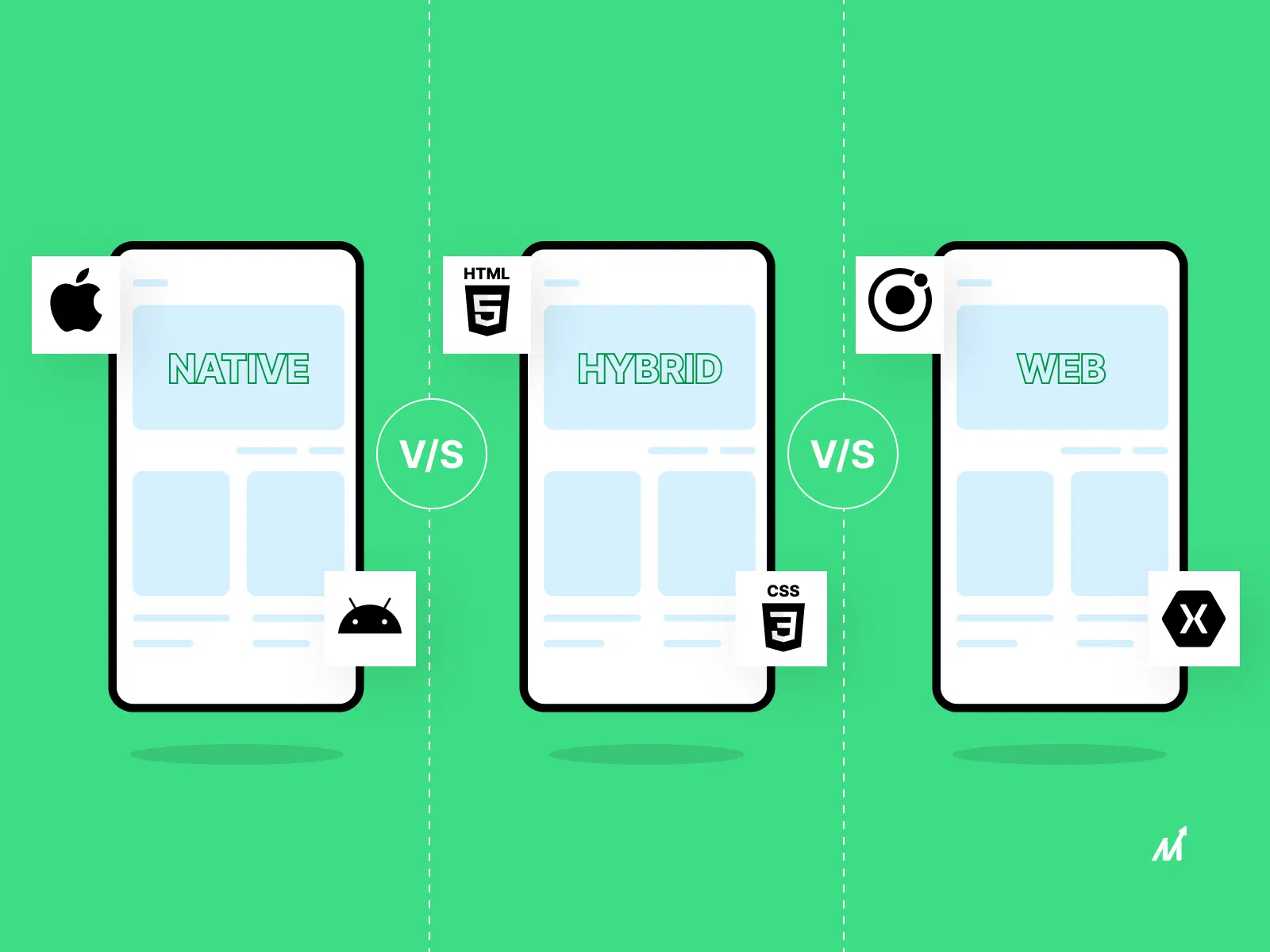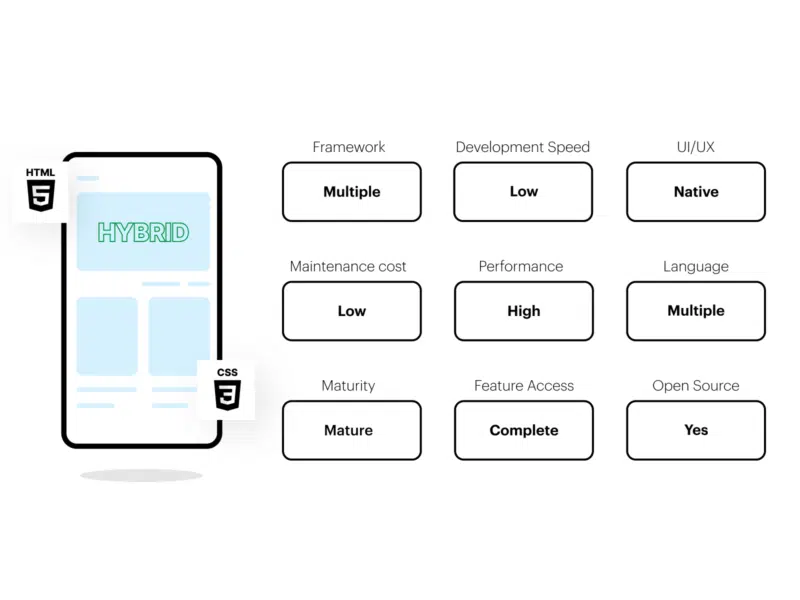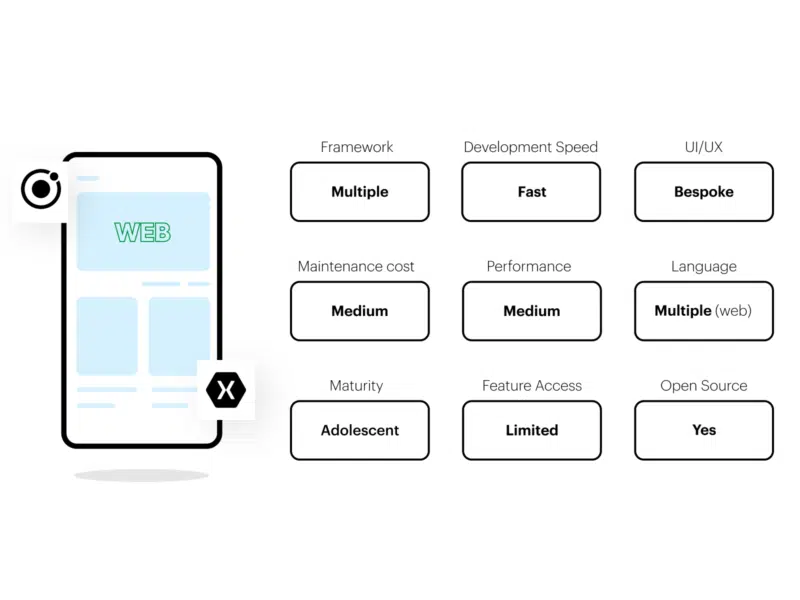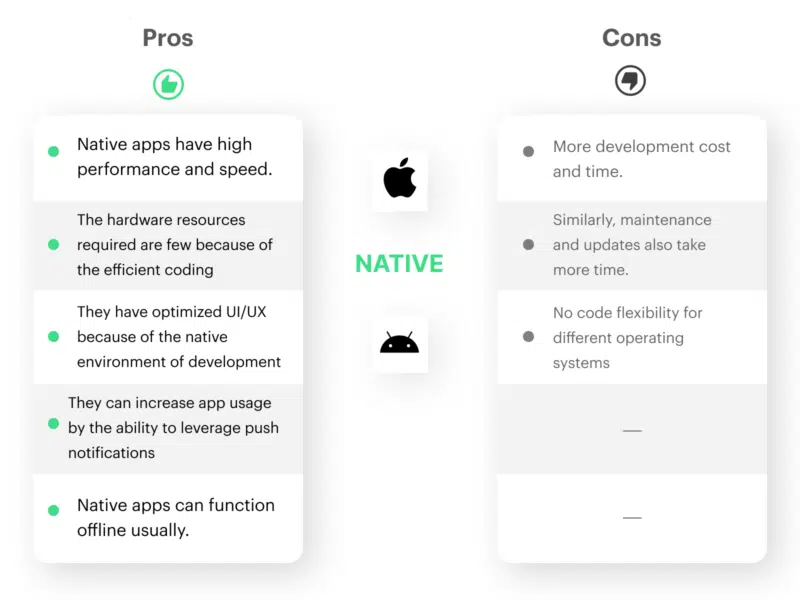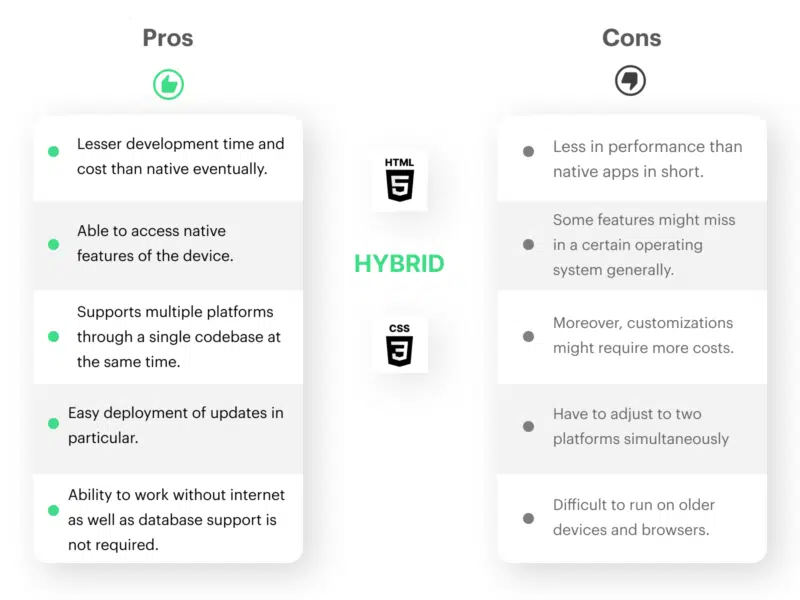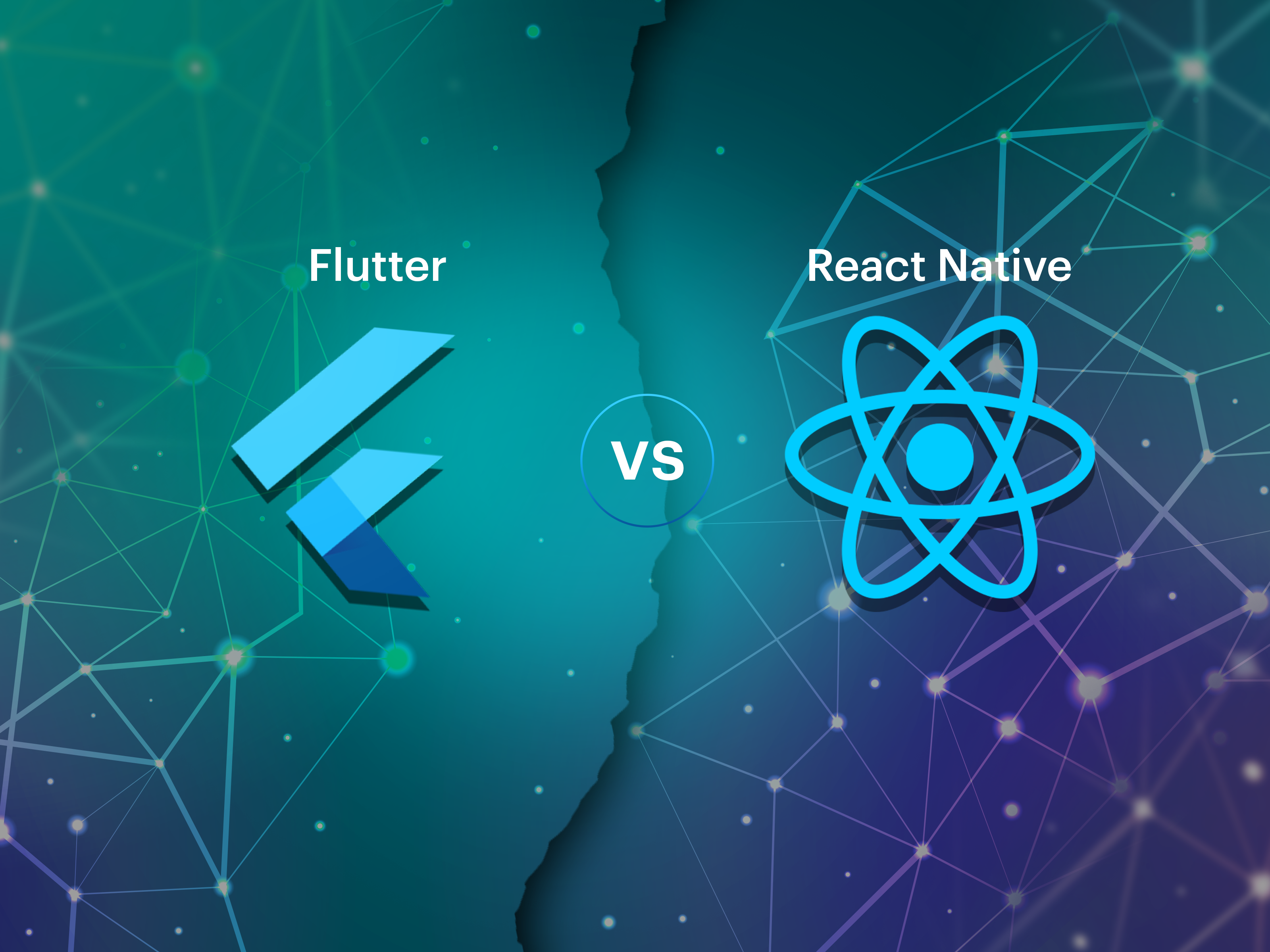When making mobile apps (native vs hybrid vs web) for your business, it can be overwhelming to choose the best framework from the different types of options available. First, one of the crucial decisions while developing a mobile app for your business is eventually choosing the right app development model. That’s the most important part of the whole process of app development services.
Suddenly, there are also other important factors to consider. Outside of the framework of your app, there are things that impact the end results. For example, the time you have for marketing the mobile apps, development cost, and maintenance cost. If you have an in-house team of expert developers or if you should hire expert developers etc.
This blog will give you a detailed understanding of the different types of mobile apps. And also the distinct development models and technology used so that you can make the right choice.
There are 3 different mobile app development types: native vs hybrid vs web app development. Specifically, the key difference between these three types of mobile apps is the platform or operating system for which they are developed. Consequently, the programming language and the technology used differ as well as the respective applications.
So, let’s start with a brief overview of the different types of mobile app development models.
Native vs hybrid vs web: Overview of these 3 types of mobile apps
1. Native app development
First-party native apps are apps developed with the tools created by the creator of either iOS or Android. That refers to Apple or Google, respectively. First-party native app development tools are as follows:
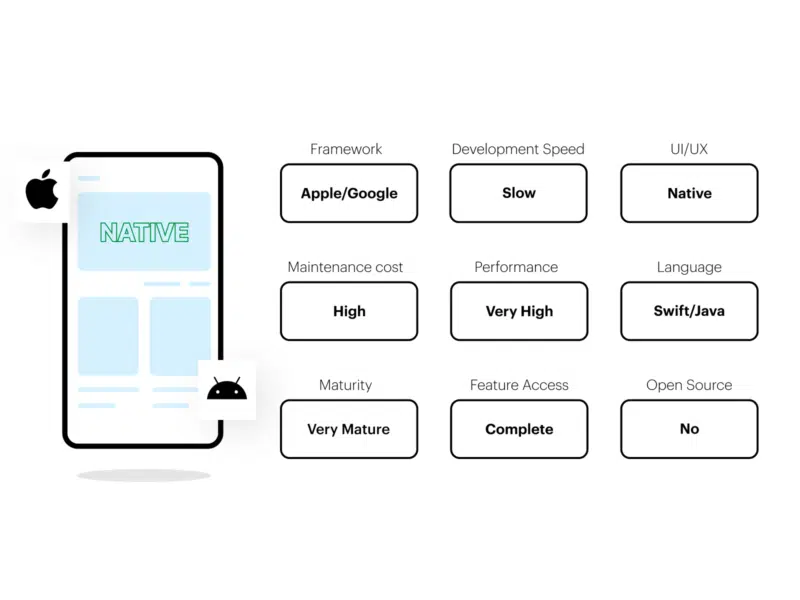
- For iOS: Xcode, the programming language in which it is written in Swift / Objective-C
- For Android: Android Studio in the programming language Java / Kotlin
Since native apps are developed in a native environment for one platform, they have the advantage of optimizing user experience. For example, buttons, gestures, and swipes are available and customized for each platform.
2. Hybrid app development
Hybrid apps (also known as cross-platform native apps) are created as a single app for multiple platforms as well as operating systems. So, there is no need to create specific apps for iOS and Android users.
In hybrid app development, a single codebase is used to build a mobile app for Android and iOS users.
One of the advantages of hybrid app development is its low development cost. And also, time since you do not require two different teams of developers for two different operating systems.
Some popular hybrid app development tools with different frameworks are Xamarine, React Native, Flutter, Uno, and Kotlin native.
3. Web app development
Web apps are the apps that are run using a web browser on a device. The UI of web apps is exactly like that of a website. The development speed of web apps is fast because of one code used for different platforms.
Some popular web app development frameworks are Microsoft blazer, Native Script, Angular.JS, React, and ionic.
One of the downsides of developing web apps is that if you ever wish to refresh the UI elements of your web app, you would have to rewrite the UI entirely, unlike native apps, where you just have to recompile your UI in such a case.
Now that you are familiar with the different types of mobile apps and their key distinctions. Let’s discuss how the technology or framework used impacts the features of overall app development respectively.
One important thing to keep in mind is that they are built differently. Hence the best from the 3 different types of mobile apps would differ for each business and resources available.
Native vs hybrid vs web: Different types of mobile apps & their technology and framework
Native Apps
The Native apps are highly intuitive and highly performant. The native app development tools support their respective operative system’s UI/UX updates. They have been distributed through Google Play Store as well as the App Store.
The development speed of native apps is slow because you have to build the same app twice for different platforms with different codes and teams of developers. Following are the key features of native apps on the basis of the technology used.
Hybrid Apps
Hybrid or cross-platform native apps are a blend of both native and web app technologies. A lot of frameworks and technologies are available to develop a hybrid app eventually.
The core of a hybrid app is written using web programming languages like HTML, CSS, and Java and runs within a native application. The development speed and cost are lesser than native apps.
Meanwhile, many modern hybrid frameworks like Ionic, Native Script, Xamarin, and React Native offer robust UI elements closer to native apps.
Web Apps
When it comes to web apps, they can be accessed through the web browser of your mobile device. Usually, web applications are written in HTML, CSS, and JavaScript. However, they do not require app stores for access. And thus avoid any gatekeeping in terms of regulations that exist in app stores. It can be used on multiple devices as well.
With this in mind, in 2017, Google launched Progressive Web Applications(PWA), which introduced more features than traditional web apps.
There are certain features that are accessible to PWA while some are not; they are as follows:
- Bluetooth
- Local notifications
- Touch gestures
- Geolocation
- Camera
- Device Motion
- Offline storage
Features that are not available in web apps:
- Push notifications
- Battery Status
- Vibration
- Geofencing
- Augmented reality
Native vs hybrid vs web: What is the best choice of app development for your business?
- You should choose native app development if you require high performance and high usability for your app. In Addition to it, the highly intuitive user interface and user experience are a big plus side of native apps.
- If you want third-party integrations and high speed for your app, then a native app might be your best choice. However, hybrid apps might suit your requirements if you want standard usability and a lower budget. Hybrid apps also support a vast user base in the meantime.
- Accordingly, you should choose web application development if you require quick deployment at a lesser cost. And also, if your app requires network access.
- However, the speed of web applications is lesser than native apps. For example, if a native app’s response time is 10 milliseconds, then a hybrid app’s response time would be 100 milliseconds. Though it is below the threshold for a person to notice, if you require apps with the highest performance, like gaming, a native app would surely be more suitable.
5 Questions to ask before making a choice
Before you set out to develop your app, it is important to start from the basics and ask yourself the following questions first:
- What is the main objective of the app in the first place?
- What features are required in the application generally?
- Who are the target customers of your business particularly?
- Should you choose in-house app development or outsource it during development?
- Moreover, what kind of user experience do you aim to offer?
Our trusted 6 step approach to building apps
Certainly, we follow a complete 6 step process for hybrid and native app development for our clients. Take a look:
- Analysis & planning
- UI & UX design
- Mobile application development
- Application Integration
- Mobile application testing
- Mobile application maintenance
Lastly, there is no one-size-fits-all for mobile app development. There is a range of frameworks and plugins to create the best app for your business.
Previously, we have provided you with insights about hybrid, web, and native app development to choose from accordingly. However, the choice largely depends on your specific business goals and requirements.
Conclusion
Finally, while choosing between the different types of app development for your business, you should take into consideration the pros and cons of every type of mobile app. Above all, the foundation should identify your unique business needs.
Therefore, consult our team of experts and app developers at Markovate. We will guide you through making the apps of your dreams and your customers’ needs.
In that case, Markovate offers a range of frameworks for hybrid app development, like Xamarin, Flutter, Mobile Angular UI, Ionic, and React Native for native app development. Hence we can assist you in finding the right fit for you.

